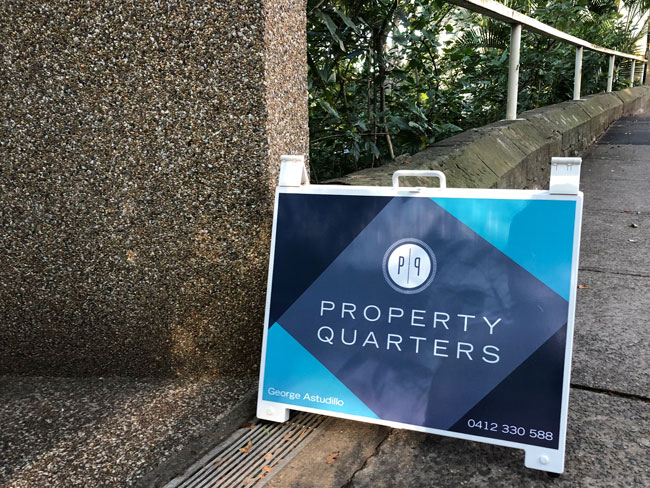
by George Astudillo | Jun 3, 2020 | Landlord mindset, Management Systems, Marketing, Planning, Presentation
Is your rental property ready for business?
Whether it’s an open-home inspection or by appointment, to be successful requires planning and preparation. How’s we conduct the perfect inspection. Early planning is crucial.
1. With or without tenants?
You are entitled to show the property to potential tenants prior to the current tenant moving out, in NSW two weeks written notice must be given to the tenant before the first and subsequent inspections are organised.
When the market is strong, we can often find a tenant to move in straight after the old tenant has vacated. However, it’s best to allow a little time to make any repairs or upgrades that may be necessary.
The main risk of hosting inspections in a tenanted property is that you don’t have much control over the presentation. Even with the best tenants however, there might be stacks of packing boxes scattered which may make the property look smaller and cluttered.
If the tenant is breaking the lease you can expect their cooperation. They won’t be able to vacate until a new tenant is found, so, it’s in their best interest as much as yours to find a new tenant quickly.
When showing the property with the current tenant still occupying, we try to arrange private appointments. This gives us time to to explain any awkward situations and also addresses the issue of security, as we are better able to look after the tenants belongings.
2. Open house or by appointment?
In the case of a vacant property, there are many advantages to having an open-house inspection.
Most tenants actually like the simplicity of just showing up without having to call an agent or owner to arrange an appointment. Additionally, having a number of interested tenants in the property at the same time will also create a sense of urgency. This is the main reason why we restrict inspection times to fifteen or twenty minutes – to make the inspection look busy.
With private appointments, we can give a more personalised tour, taking time to highlight all the best features.
3. First impressions
You only get one chance at a first impression.
We like arrive early and prepare the property to its best advantage.
* Open curtains, blinds, windows and doors to freshen the property. Use curtains and blinds to your advantage to soften less-desirable outlooks while letting in as much light as possible.
* Switch all lights on, even in rooms that may not need it; people love light. In the kitchen, turn on the range- hood light and bench-top lighting. Use lamps to create mood lighting where possible.
* Ensure sinks and basins are clean and clear of any residual water.
* In winter we’ll try to have the heating on and in summer the air-conditioner, to level out any extremes.
* Turn on outdoor spas, fountains and garden lights.
* Blend some essential oils to create a calming fragrance, such as lavender and bergamot.
We are now ready to host a perfect inspection.
About Us
George Astudillo is the founder of Property Quarters, an agency that values communication and great relationships with its landlords.
George now has more than 30 years in real estate, including 15 years as the owner of a national real estate franchise. He’s also an accredited auctioneer and is the author of “The Landlord Mindset”, a book with his best tips to help landlords look after their investments. His book has been quoted in the SMH, The Huffington Post and The Age.
As the founder of Property Quarters, George takes great care in looking after his landlord’s investments. Having seen it all and worked with may landlords and tenants, he’s a strong mediator and negotiator and knows how to navigate through property legislation.
George is trusted by his landlords to advise on the financial management of their investments. He’s put in place proven processes to ensure each property he looks after is managed effectively to retain its value, quality tenants and rental income.
If you’re looking for a property manager who thinks like a landlord and whose business is built on tested processes, contact us by clicking HERE.
Copyright © 2022, www.propertyquarters.com.au

by George Astudillo | May 1, 2020 | Financial, Landlord mindset, Marketing, Planning
Where do you start when marketing your investment property?
The answer is- setting a rental price.
In our previous blog we discussed ‘Marketing Your Rental Property- The 5 Essentials’ now we will start at the beginning. It is important to get your initial asking price right as the wrong thinking and strategy could lead to lengthy vacancies subsequently affecting your bottom line.
Market value is the price a tenant is prepared to pay a landlord under normal conditions at a given time. What that means is that, from a field of possible properties to choose from, the tenant will decide which one represents, to them, the most appropriate home and the best value.
There are many factors that can influence the rental price, but the two main ones are supply (how many properties are available) and demand (how many tenants are available) at this particular moment.
If there are more tenants looking to rent than there are properties, they will compete with each other, pushing prices up. On the other hand, if there are more properties available than there are tenants, the landlords compete, pushing prices down.
The relationship between supply and demand for rental properties can be estimated by knowing the vacancy rate. The vacancy rate indicates the percentage of investment properties that are currently vacant. Each area has a different vacancy rate, and each area has a different method of interpreting the vacancy rate.
For example, Sydney vacancy generally hovers around one to three per cent. The lower the vacancy rate, the tighter the market and the stronger the rental prices. At vacancy rates below one per cent, tenants become desperate and start offering more than the asking price to secure a property.
In other areas, a vacancy rate of eight to ten per cent might be considered normal. Check out the vacancy rates in your area, as this is the first indicator of how strong the rental market is at the moment.
Keep in mind that, like buying, renting has seasons as well. Generally, the closer to Christmas, the fewer tenants will be looking. This starts to become noticeable in November, but December is traditionally very quiet. On the other hand, beachside properties are more desirable in summer and become quiet in winter.
Research
Once again, it’s time to research. There’s a number of resources that be very helpful in giving you an idea of current prices. Companies such as Australian Property Monitors and CoreLogic RP Data can provide information on properties that have been leased in your area.
It’s also helpful to know which properties you will be competing with. While tenants start their search sorting properties by price and location, it’s quality and cleanliness that will determine value leading to their ultimate choice.
Look on domain.com.au or realestate.com.au for a list of what is available. However, to get a real feel for comparable properties, you need to take the time to inspect them.
Finally, keep in mind that your expenses have no bearing on what a tenant will be willing to pay. This is a trap many investors set for themselves – needing a certain rental to cover their costs. Eventually, they either get lucky, which is rare, or lose months of rent.
Pricing strategy
Once you have a feel for price, an effective strategy is to start at slightly higher than the market rate and be ready to move down quickly if necessary. Being slightly above the market gives you the opportunity to get a premium rent if it’s out there, but be ready to listen to the market and act quickly if it’s not.
Renting a property is different to selling your home. When selling, it pays to wait for the best price you can negotiate, even if that may take a little while. After all, you only get one chance. With renting, every week the property is empty is costing you money in lost income.
Chasing a few extra dollars in weekly rent makes no sense if you are losing thirty times that every week in lost rent. The longer the property is vacant, the less money you will make. Sometimes, accepting a lower rent, particularly to secure great tenants, is the wise move.
About Us
George Astudillo is the founder of Property Quarters, an agency that values communication and great relationships with its landlords.
George now has more than 30 years in real estate, including 15 years as the owner of a national real estate franchise. He’s also an accredited auctioneer and is the author of “The Landlord Mindset”, a book with his best tips to help landlords look after their investments. His book has been quoted in the SMH, The Huffington Post and The Age.
As the founder of Property Quarters, George takes great care in looking after his landlord’s investments. Having seen it all and worked with may landlords and tenants, he’s a strong mediator and negotiator and knows how to navigate through property legislation.
George is trusted by his landlords to advise on the financial management of their investments. He’s put in place proven processes to ensure each property he looks after is managed effectively to retain its value, quality tenants and rental income.
If you’re looking for a property manager who thinks like a landlord and whose business is built on tested processes, contact us by clicking HERE.
Copyright © 2022, www.propertyquarters.com.au

by George Astudillo | Mar 2, 2020 | Financial, Landlord mindset, Legislation, Management Systems, Planning
Landlord insurance is your investment property safety net and should be considered a ‘must have’.
It will protect you, your family and your property from potential financial difficulties, thereby lowering your investment risk.
Nobody knows what’s around the corner. Situations change and good tenants can also change under specific circumstances. You don’t want the events in your tenants’ lives to consequently have an adverse impact on yours.
Looking for the appropriate insurance cover can be confusing and time-consuming. Take your time deciding as above all you don’t want to find out you are not covered when you need it most.
The following is a guide to the different types of cover and what they entail.
Building insurance covers:
- Replacement cost of the building;
- Demolition and removal of debris;
- Locks and keys; and
- New structures to comply with all statutory requirements.
If you own an apartment, building insurance is paid through your quarterly fees. Wallpaper and paint may not be included though and should therefor be included in your contents cover. Other items that can be added separately are things such as air-conditioning, lighting and flooring.
Contents insurance covers:
- Carpet and other flooring
- Light fittings
- Window finishes
- Manchester and linen (if supplied)
- Any furniture itemised in the tenancy agreement
- Kitchenware cabinets and appliances
- Bathroom vanity, cabinetry and shower screens
- Tap ware
- Tiling, paint and wallpaper
- Household goods such as gardening equipment
- Washing machines and dryers
- Potted plants
- Portable pools, spas and equipment
In an apartment, make sure you know which items are not covered by the strata building insurance as you may want to include them in your own insurance. In the event of fire elsewhere in the building, your unit may be affected by smoke and water damage consequently needing new paint and carpet, or at the very least cleaning as a result.
Events
There is a wide variety of events that can be covered, including:
- Accidental loss or damage
- Malicious damage
- Theft
- Fire or explosion
- Lightning
- Earthquake
- Riot or civil commotion
- Water damage – leaks, rain, floods and tsunamis
- Oil heater leakage
- Accidental glass breakage
- Storm or rainwater
- Electric motor burn out
- Impact from aircraft, trains, automobiles, space debris, satellites, falling trees or branches, TV antennae, satellite dishes or radio masts
Keep your property safe from unnecessary damage by reading our previous blog: Winter is Coming- A Rental Property Checklist.
Check policy exclusions carefully. For example, some policies do not cover:
- Accidental damage caused by the tenants
- Theft by the tenant
- Damage by the tenant’s pets
- Tsunamis or other actions by the sea or rivers
Loss of rent
This covers you for loss of rent in the event that the property is not habitable and cannot be leased due to any of the events listed above.
It also covers any rent default by the tenant. However, there are usually conditions attached to a rent default claim, so check the conditions carefully.
When choosing a good tenant there are a few things to consider in order to maximise your financial return. See our blog: 3 Keys to Choosing the Right Tenant.
Public liability
This relates to your legal liability as the owner. It is in regards to an event at your investment property which results in death or injury to other people or damage to other people’s property in or at your investment property.
Consider a minimum public liability cover of no less than twenty million dollars.
No matter what your appetite for risk is, having the right Landlord Insurance goes a long way to creating peace of mind.
About Us
George Astudillo is the founder of Property Quarters, an agency that values communication and great relationships with its landlords.
George now has more than 30 years in real estate, including 15 years as the owner of a national real estate franchise. He’s also an accredited auctioneer and is the author of “The Landlord Mindset”, a book with his best tips to help landlords look after their investments. His book has been quoted in the SMH, The Huffington Post and The Age.
As the founder of Property Quarters, George takes great care in looking after his landlord’s investments. Having seen it all and worked with may landlords and tenants, he’s a strong mediator and negotiator and knows how to navigate through property legislation.
George is trusted by his landlords to advise on the financial management of their investments. He’s put in place proven processes to ensure each property he looks after is managed effectively to retain its value, quality tenants and rental income.
If you’re looking for a property manager who thinks like a landlord and whose business is built on tested processes, contact us by clicking HERE.
Copyright © 2022, www.propertyquarters.com.au

by George Astudillo | Aug 7, 2019 | Financial, Landlord mindset, Management Systems, Planning
There are alternatives but you need to be aware of the pitfalls.
(From the article and interview featured in The Huffington Post Australia)
With so many people literally locked out of the hot Sydney property market, it’s only natural to look for alternative ways to get a piece of the action. Perhaps you could co-invest with a sibling or close friend?
You could look at ‘rent-vesting’, buying a car space or consider property trusts.
One solution by Fintech company BRICKX is a way to invest in a property for less than $100. It works by dividing individual properties into 10,000 ‘Bricks’, which are effectively units, in a Trust.
BRICKX publicly launched in September 2016 and operates as a retail managed investment scheme for people who could otherwise not afford to get into the property market. It works by offering fractions of a property, known as Bricks, rather than purchasing entire houses or apartments.
BRICKX recently put a Bondi Beach apartment on the market, giving investors the opportunity to access the lucrative Bondi property market for just $96.
Real estate expert and author George Astudillo told The Huffington Post Australia there are other ways to get into the property market, but you need to be aware of the pitfalls too.
“If we look at investing with friends or siblings, it’s usually one of those ‘It was a great idea at the time’ moments. Very few property partnerships work well, and there are several reasons why,” Astudillo said.
Co-investing with a sibling or friend
Risk tolerance: How people relate to risks varies from person to person. An investor with low tolerance to risk will need to be cautious and utilise a strategy based on security, while an investor with a higher tolerance to risk will be more aggressive with their choice of strategies. Finding someone that is compatible with your investment comfort zone is quite difficult and this difference in attitude will lead to friction. Be aware of your comfort zone, take a look at our blog “What is Your Risk Tolerance?”
Workload: Many partnerships become undone when one party does all the hard work. When it comes to investing in property there will always be decisions to be made. If one partner is always relied upon to make decisions, this can lead to resentments.
Affordability: All partners need to be able to afford not only the purchase of the property but also its ongoing maintenance and repairs. When renovating, can all parties afford the level of quality that will attract the appropriate tenant and rental?
“You also need to consider exit timing. Selling an investment property is all or nothing. If one partner needs to sell, there needs to be a plan for the other partners to buy that share or decide whether the property need to be sold,” Astudillo said.
Property Trusts
Property trusts are an easy way to buy into the property market indirectly. These are either known as Australian Real Estate Investment Trusts (A-REIT) which are listed on the Australian Securities Exchange or Unlisted Property Trusts.
“Before investing you need to know how each trust is managed as this is more like buying shares than property. You can also consider buying shares in a listed real estate company,” Astudillo said.
Rentvesting
When you can’t afford to buy a property you would be comfortable to live in, you buy a property as an investment.
“This way, you can then rent a property that is comfortable and rent out your investment, becoming both a landlord and a tenant,” Astudillo said.
“Rentvesting is probably the best of both worlds. It allows you to get into the property market without the inconveniences of living in a property that makes you unhappy.”
About Us
George Astudillo is the founder of Property Quarters, an agency that values communication and great relationships with its landlords.
George now has more than 30 years in real estate, including 15 years as the owner of a national real estate franchise. He’s also an accredited auctioneer and is the author of “The Landlord Mindset”, a book with his best tips to help landlords look after their investments. His book has been quoted in the SMH, The Huffington Post and The Age.
As the founder of Property Quarters, George takes great care in looking after his landlord’s investments. Having seen it all and worked with may landlords and tenants, he’s a strong mediator and negotiator and knows how to navigate through property legislation.
George is trusted by his landlords to advise on the financial management of their investments. He’s put in place proven processes to ensure each property he looks after is managed effectively to retain its value, quality tenants and rental income.
If you’re looking for a property manager who thinks like a landlord and whose business is built on tested processes, contact us by clicking HERE.
Copyright © 2022, www.propertyquarters.com.au

by George Astudillo | Jul 1, 2019 | Financial, Landlord mindset, Management Systems, Tenant
The right tenant is the corner stone of a successful investment property. This is where the rubber meets the road. The tenant can either make or break both your financial position and your spirit. Many property owners have already experienced the pain and frustration of a nightmare tenant which can potentially be 12 months of well.. hell.
The following are the three crucial qualities we need to identify and look for in a tenant to become the perfect match for your property,
1. Reliability – will they pay the rent on time?
Successful applicants will need to prove financial stability and a regular income. Without this your steady income stream is at serious risk. Once this has been established, avoid the burden of costs associated with rental arrears by ensuring your tenant has a long history of disciplined payments. After all you may be relying on this income to pay bills of your own, such as a mortgage.
2.Responsibility – will they look after the property?
A responsible tenant that will treat your property like their own are worth their weight in gold. Respect and diligence goes a long way, this means taking great care in the cleanliness and presentation of your property as well as reporting any maintenance concerns with effective communication. Remember: A clean tenant that takes care of their home and surroundings will be attracted to apply for a property that is in tiptop shape to begin with.
For more information on presenting your property to attract the right tenants see our previous blog “7 Easy Ways to present Your Property to Attract Great Tenants”
3.Co-operation – will they be co-operative in the event of an emergency?
An easy-going effective relationship between landlord/agent and tenant is essential. Emergencies will happen from time to time and prompt access to the property to carry out repairs or clean ups can save further damage and/or costs. A good tenant needs to be willing to communicate and be co-operative to find and implement a solution if necessary.
Having the right tenant will not only give you a good financial return but will also give you the peace of mind you are looking for. Take your time in choosing a quality tenant and don’t be afraid to go with your instincts on occasion, it is better for your property to remain empty for another week then to be occupied with a bad tenant that will be difficult to remove.
When you find ‘the one’ look after them and they will in turn look after your investment.
See our previous blog for the featured Landlord Checklist, a guide to a maintaining a happy tenant in “How to Keep a Great Tenant”.
About Us
George Astudillo is the founder of Property Quarters, an agency that values communication and great relationships with its landlords.
George now has more than 30 years in real estate, including 15 years as the owner of a national real estate franchise. He’s also an accredited auctioneer and is the author of “The Landlord Mindset”, a book with his best tips to help landlords look after their investments. His book has been quoted in the SMH, The Huffington Post and The Age.
As the founder of Property Quarters, George takes great care in looking after his landlord’s investments. Having seen it all and worked with may landlords and tenants, he’s a strong mediator and negotiator and knows how to navigate through property legislation.
George is trusted by his landlords to advise on the financial management of their investments. He’s put in place proven processes to ensure each property he looks after is managed effectively to retain its value, quality tenants and rental income.
If you’re looking for a property manager who thinks like a landlord and whose business is built on tested processes, contact us by clicking HERE.
Copyright © 2022, www.propertyquarters.com.au

by George Astudillo | Jun 3, 2019 | Landlord mindset, Management Systems, Presentation, Tenant
More than 60 per cent of Aussies are pet owners so it’s a major concern for renters.
According to the RSPCA, Australia has the highest pet ownership in the world, with 63% of Australian households owning a pet totalling over 25 million pets. Predictably, dogs are the most common pet at 39% followed by cats at 29%.
With companionship being the chief reason for having pets, it’s no wonder we treat our pets as children.
So what happens if you own a pet and you’re renting?
If you’re planning to rent an apartment, the first challenge is the Strata by-laws which may prohibit the ownership of any pet.
After that it’s all up to the landlord.
So why do so many landlords refuse pets, and keeping in mind the law of averages, many of these landlords probably have pets of their own?
Well, it’s because pets often mean fleas, stains, odours, noise and damage. In NSW a landlord is not permitted to ask for a bond any more than the equivalent of 4 weeks rent. If a landlord allows a tenant to have a pet on the property, all they are allowed to ask is that the property be fumigated when the tenant vacates.
For a landlord there is very little upside to the risk of having a pet on the property. Or is there?
Over the next couple of years, the supply of apartments in Australia is set to increase substantially with a large proportion of these properties ending up as rentals. This will mean stronger competition for tenants. To weather the storm, landlords will need to make their properties stand out from the crowd to avoid vacancy and lower rental yield.
With so many potential tenants with pets is it possible for a landlord to consider allowing pets as their point of difference? And if so, how do you make a property pet friendly?
These are the main areas that need to be thought through,
- Floor surfaces – Carpets can absorb odours and become stained, timber floors can scratch easily and stone can be too porous without an effective sealer. Consider vinyl as its warm underfoot and easily cleaned.
- Paint needs to be durable and easy to clean. Choose a quality name brand as they tend to last longer between repaints.
- Ventilation is essential. If pets are left inside for long periods of time odours can build up.
- Curtains can be tricky particularly with cats, blinds can make better sense
- Outdoor areas need to be secure and easy to maintain.
- Regular inspections are essential. At least twice a year inspect the property for wear and tear and for damage. It’s not only good practise for every property but super important with pets.
- Which pet – The style of pet is also crucial. A large dog in a small unit is asking for trouble. Although there are many families in this situation handling it well, as an investor it raises the risk quite substantially. Cats are generally good house pets, they sleep most of the day and are usually very clean, although some breeds can be trouble – too much energy.
- Rental Bond – Western Australia is the only state where a landlord can ask for a pet bond up to $260.00.
- Landlord Insurance is another area that needs to be checked as most policies do not cover for damage caused by pets.
- Lease terms – You can include a special condition in the tenancy agreement that the property be steam cleaned and fumigated when the tenant leaves if you have allowed the tenant to keep a pet.
- Anti-discrimination – You are not allowed to exclude a tenant whose pet is trained to assist with a disability, such as a guide dog.
- References – Be very thorough with references. Make sure you are comfortable that the character of the tenant is in keeping with keeping having a pet in your property. Better be safe than sorry.

Copyright © 2016, www.propertyquarters.com.au







